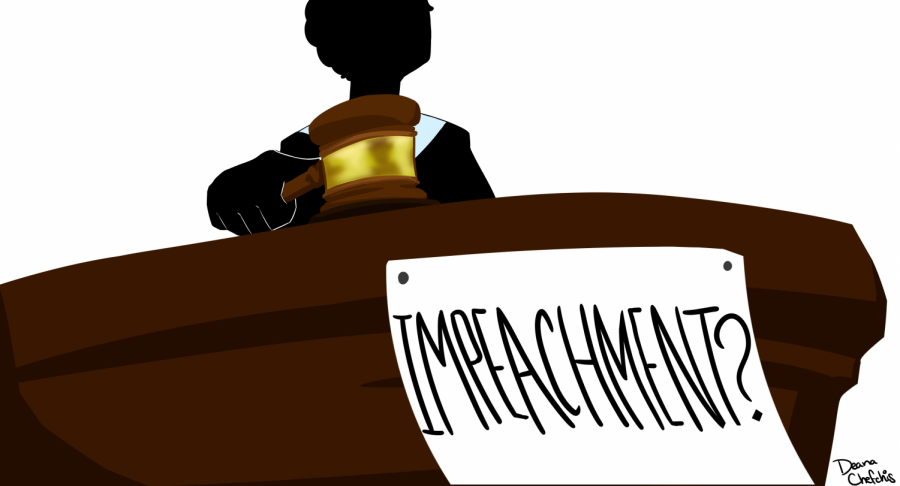Impeachment 2.0
What happened with some view from AA students
The week of February 7, 2021 was historic. For the first time, a United States President underwent trial for a second impeachment. Donald Trump, 45th president of the United States, faced impeachment over his involvement in the January 6 attack on the capitol by a pro-Trump mob; the US House charged him with ‘incitement of insurrection.’ During the trial, House Impeachment managers attempted to prove that Trump incited the riot, and tried to convince Republican senators to vote in favor of conviction. To impeach Trump, 17 Republican senators needed to vote with the 50 Democrats. The House Managers were ultimately unsuccessful, swaying only seven Republicans, resulting in Trump’s acquittal. The House Managers presented a convincing case, but as is usual in impeachment trials, most Senators from the same party as the president couldn’t be persuaded to vote against the most powerful man in their party. However, the seven Republican votes to convict made this the most bipartisan effort for impeachment in history. Those seven votes, as well as events during the week, signaled a growing rift in the Republican party, which is divided between moderates who are attempting to preserve the ceremony and decorum of the party and those Republicans who are either further right or see the advantages of appealing to Trump’s base.
The House of Representatives, led by Speaker Nancy Pelosi, impeached Trump on January 13, in a 232-197 vote. Ten Republicans voted to impeach, led by Representative Liz Cheney (WY), third on the Republican leadership scale. Representative Jamie Raskin (D-CA), lead impeachment manager, drafted the single article of impeachment, but, the article of impeachment was not delivered to the Senate until January 25, as Senator Mitch McConnell (R-KY), the majority leader at the time, refused to call the Senate into session to start a trial while Trump remained in office. Starting the trial after Trump’s term ended led Senators to ask themselves not only if Trump was guilty, but also whether or not Congress has the power to impeach a public official who is no longer in office.
In a Senate impeachment trial, lawmakers in the House play the role of prosecutors, known as House Managers. They present their case to the Senate, which serves as the jury. In a normal courtroom, there would have been several conflicts of interest in this trial. For one, most of the Senators were witnesses to the event that sparked the trial. Second, in a traditional courtroom, jurors are meant to be impartial, and great efforts are made by both the defense and prosecution to ensure this. In the Senate chamber, however, the jurors are anything but impartial. Democrat or Republican, a Senator’s vote in an impeachment trial can influence them politically for years after. Republicans faced a choice that may determine the future of their party going forward. A vote to impeach Trump was a move to preserve the traditional Republican party but was also a political liability considering those Senators who voted to convict may lose the support of Trump’s powerful base. Trump has already made threats to those Senate and House members who voted in favor of his impeachment, vowing to challenge them in primaries with candidates more in favor of his agenda. Meanwhile, the Republicans that voted to acquit (the majority of Senate Republicans), solidified Trump’s current stature as a leader of their party.
Democrats, meanwhile, hoped to reach both Senators and Americans in their presentation. The nine house Democrats, led by Raskin and including Delegate Stacey Plaskett of the Virgin Islands, the first non-voting member of the House of Representatives to be a house manager, showcased the diversity of the Democratic party. The House Managers went into the trial knowing that they were unlikely to succeed in convicting Trump, but they were also aware that this was an opportunity to gain the support of voters who were shocked by the January 6 riot while simultaneously discrediting Republicans who voted to acquit.
Carter Elias, ’21, who doesn’t identify with a political party, thinks it would have been in the best interests of the Republicans to convict. “The smart political move would have been to convict and bar [Trump] from running for office…right now Trump has too much power over the party.” Though he was conflicted on whether or not he was in favor of impeachment, he didn’t “really care, because [he] knew that the outcome would have been acquittal anyway.” Sara Perez, ’22, who is a Democrat, was in favor of impeachment because “he incited a riot. People can say that his speech was just figurative language, but if you look at everything that he said he really did incite a riot.” She thinks that “the future of the Republican party really is at stake here.”
Though the impeachment trial ultimately resulted in acquittal, it was more successful for Democrats than for Republicans, in Elias’ opinion. “It was a smart political move because Democrats could say ‘look, we kept fighting even after he was out of office but the Republicans were too corrupt to do anything about it.’” Perez wasn’t “entirely surprised” by the acquittal, but “was a little disappointed.” The Impeachment trial revealed not only Democrats’ desires to see Trump and his brand of conservatism condemned, but it also provided the American people with a clear picture of Republican infighting and the issues that surround the party. Going forward, Trump will face criminal trials, perhaps not for incitement but other issues (such as his tax returns), but for now, lawmakers have debated the issues of the Trump presidency for what may be the last time and can move on to the demands of a new administration and the challenges of the COVID-19 pandemic. While the question of “did Trump incite the January 6 riot” has been resolved by Congress, it will continue to be debated in political circles, among voters, and in history class for decades.







